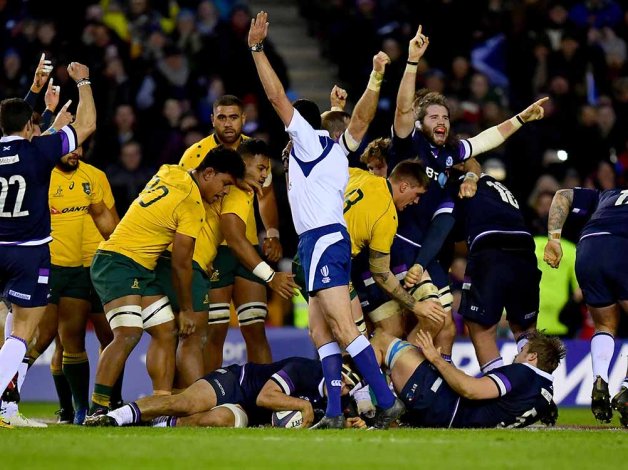
Winning the Six Nations may bring the most tangible rewards outside of World Cups, but there is no doubt that the top northern hemisphere teams measure their ultimate strength against their counterparts from the south.
Three more wins makes it a fine autumn for England
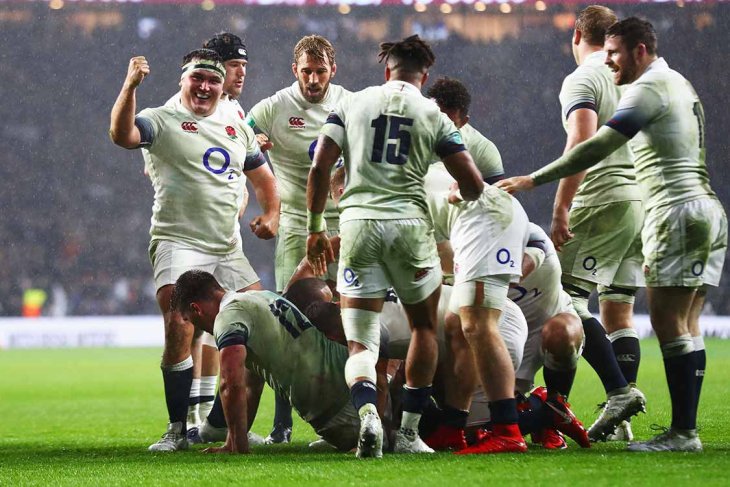
With just one World Cup being won by a northern hemisphere side - England in 2003 - it has fallen to the man who coached their Australian opponents that day to transform the fortunes of a country that failed to make it out of the group phases two years ago.
That calamity for Stuart Lancaster's side seems almost unimaginable now, not least because their elimination was sealed by a heavy defeat at Twickenham by a rampant Australia that went on to reach the final.
Since then, England have played Australia five times - twice at Twickenham and three times away - and have won on every occasion.
This autumn's victory was one of the most satisfying. The emphatic 30-6 scoreline may have flattered England in some ways - two Australian tries were disallowed and one English score permitted as a result of close Television match Official verdicts - but the way England's bench ensured the home side pulled clear with three late tries against tiring opponents demonstrated huge strength in depth.
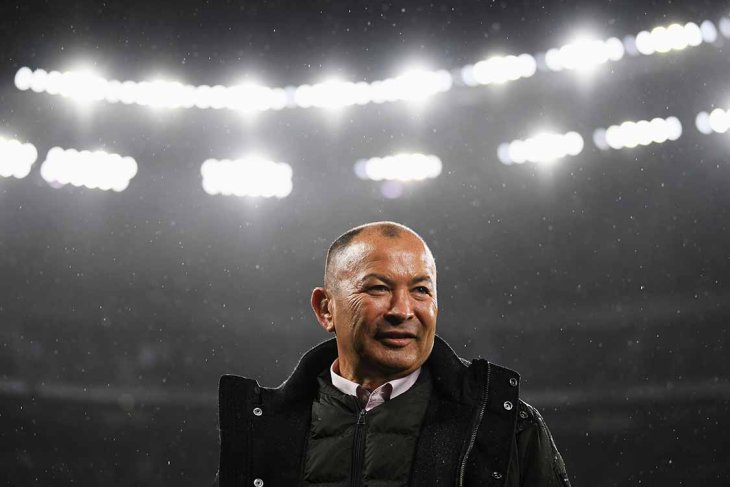
Indeed, it may be the flexibility in personnel and the wide array of selection options that gives English fans the greatest hope for the future. True, World Player of the Year award nominees Owen Farrell and Maro Itoje will always, if fit, be the first names on the team sheet in big games, but head coach Eddie Jones was still keen to add some squad depth, handing out 12 new caps. Not all will have stellar careers, of course, but the chance will be there for talented players to make a name for themselves with the next Rugby World Cup on the horizon.
The victory over Australia came after a somewhat underwhelming 21-8 win over Argentina in the opening game. The Pumas had come into the match in poor form, having lost every game in the Rugby Championship. However, England were also missing 12 players, including the rested Itoje and Farrell, while Eddie Jones had put skipper Dylan Hartley on the bench to give him a taste of what it was like to be a 'finisher'. If the match was, as Jones put it, a "grindathon", it happened in the most experimental of circumstances.
Whether Samoa would fare any better than Argentina if they could take part in the Rugby Championship is open to debate, but the Pacific islanders are nothing if not entertaining, losing 44-38 to Scotland at Murrayfield in what was the highest scoring international ever played at the venue.
England gave them no chance of running them close at Twickenham, scoring their first try in the opening three minutes and running out 48-14 winners.
A trio of wins means England end the year in fine fettle, with Jones named coach of the year at the World Rugby Awards. As ever, the coach is far from satisfied, and has challenged his players to make history with their first hat-trick of Six Nations titles. Few would bet against this strong and deep England squad sweeping all before them once again in the spring.
An autumn of promise for Scotland
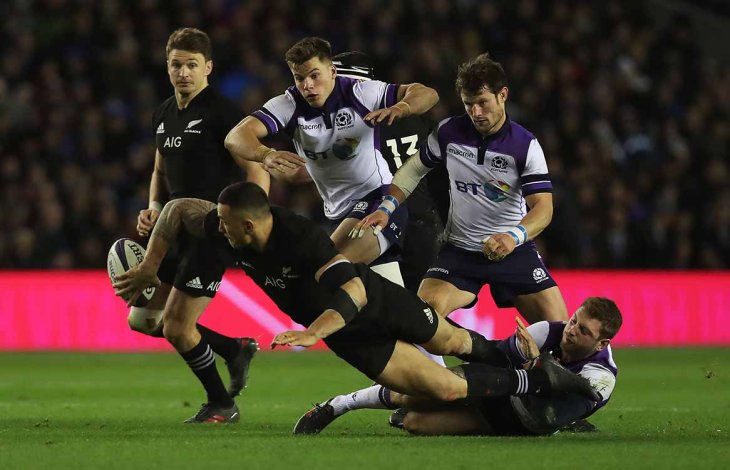
For Scottish rugby fans, recent autumns have tended to be somewhat gloomy affairs. The odd unconvincing win against a Tonga or Samoa has been a faint highlight in the midst of regular beatings when the likes of Australia, South Africa or New Zealand come to town.
This time, however there is a distinctly more upbeat mood at the end of the season, reverberating round the stands of BT Murrayfield and rolling out across the land. Whisper it quietly, but we may be seeing the making of the best Scotland side in many years.
Samoa were the first opponents and put in a hugely entertaining display. The Scots were first out of the traps and needed to be, racing to a 25-10 lead by half-time.
With Stuart McInally adding another try soon after the interval, Scotland were 32-10 up and seemingly cruising. But they had to withstand a formidable fightback by the Samoans as the half progressed. Past sides might have folded, but Alex Dunbar and Pete Horne scored further tries to ensure a final score of 44-38, the highest scoring international in BT Murrayfield's history.
Speaking after the match, head coach Gregor Townsend called for his side to raise their game. He commented: "We’ve got a lot to work on, but we thought that would be the case. We were up against tough opposition today. It was our first game and we’re happy with the win, but we’ve got a lot to work on in attack and defence."
Some might regard losing to New Zealand as a reality check, but to only go down 22-17 was a tribute to how much Scotland have improved.
After a tight first half ended 3-3, New Zealand surged into a 15-3 lead in the second period, the sort of situation where the All Blacks might have been expected to romp home. Instead, from there and from 22-10 down the Scots battled back, the rattled All Blacks had both Sam Cane and Wyatt Crockett sin-binned at different stages, and a converted try by Jones left the world champions clinging on.
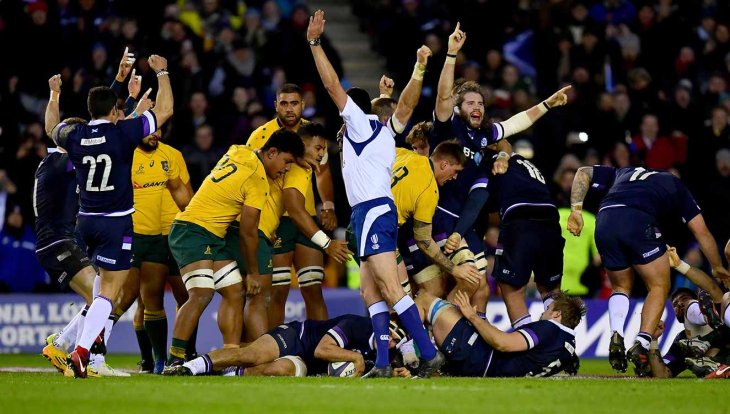
If New Zealand was a near miss, the appearance of Australia was a glorious day. True, the Wallabies had just suffered a blow to their morale by losing 30-6 at Twickenham, but Scotland did not just beat them - they thrashed the Australians 53-24, a record win that left the Edinburgh crowd buzzing with joy.
Indeed, over three matches Scotland had scored no less than 16 tries. To do that, to batter the team that controversially ousted them from the last World Cup, and to impress neutral judges, all showed this is a team on the rise.
The latter factor is perhaps the most exciting. It might be easy to dismiss the form of the Scotland team as a bit of over-excitement after so many lean years, but former England player Jeremy Guscott is convinced this Scotland team are now the real deal.
Writing in his BBC Sport column after the New Zealand and Australia matches, he said: "With these two performances, this appears to be a new era for Scottish rugby. This side means business and they have a big chance for the Six Nations."
A mixed autumn that ended well
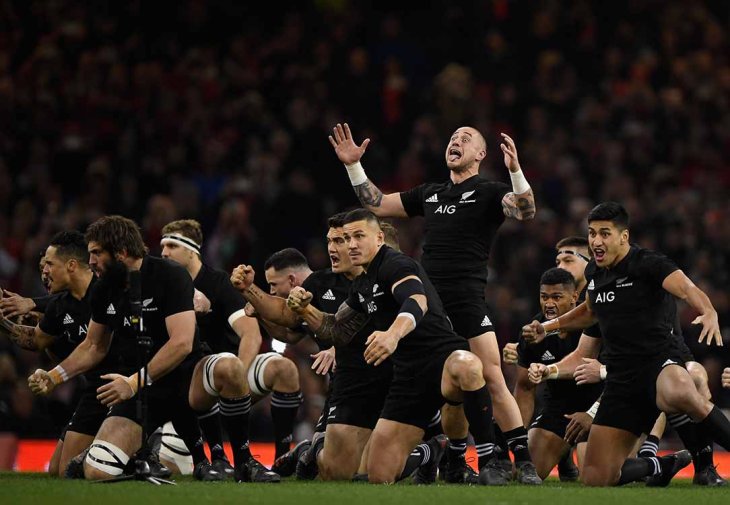
They say "all's well that ends well," and Welsh rugby fans will certainly hope that is the case after a distinctly mixed autumn campaign of four matches, of which two were lost and two won.
With the side trying to rebuild in time for the next World Cup, the arrival of the three big teams from the Southern Hemisphere was, if nothing else, a useful barometer.
Losing 29-21 in the opening game to Australia was something of a curate's egg; true, the victory for the Wallabies in Cardiff contrasted with their subsequent heavy defeats at Twickenham and Murrayfield, but they arrived in the Northern Hemisphere on a high after a victory over New Zealand.
Wales certainly started well against the 2015 World Cup finalists, scoring the opening try through Steff Evans, and the crowd certainly had much to cheer. Nonetheless, the defeat was a 13th in a row against Australia, the sort of run that needs to be arrested if Wales are to challenge for World Cups anytime soon.
The Georgia game brought mixed emotions for different reasons. The 13-6 win over the east European minnows, aided by a Hallam Amos try and eight points from Rhys Priestland's boot, did at least mean a tick in the win column, but fans might have expected a much more impressive haul of points against such modest opponents, who forced Wales to hold on with a series of concerted attacks late on.
New Zealand's arrival challenged Wales to raise their game, and once again scored first, this time through a Leigh Halfpenny penalty. However, despite dominating possession for long periods, they could not turn territory into points, in contrast with the assassin-like manner in which the All Blacks took their chances.
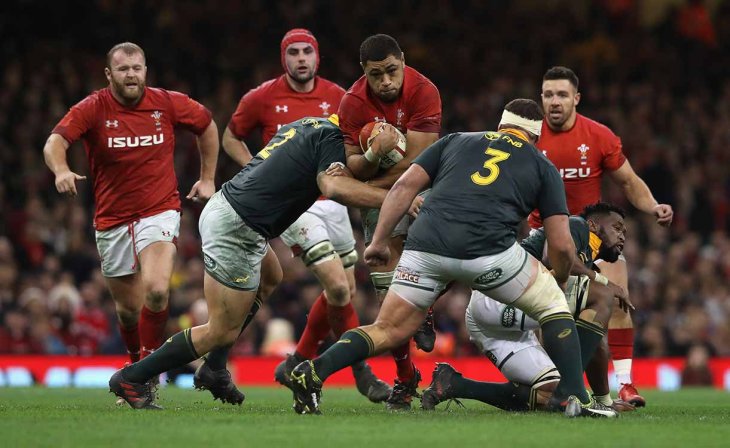
Tries by Scarlets pair Scott Williams and Gareth Davies kept Wales in the game, but in the end a 33-18 defeat extended another lengthy run of failure against a team from the other side of the world, this time one that stretches back 64 years.
Had these three matches been the end of the story, it would have been a far from happy Christmas for players and fans alike. But victory in a pre-Christmas cracker against South Africa has brought plenty of reason for festivities.
In a team looking for new stars to emerge for the future, Hadleigh Parkes may be the man. Not since George North had a Welshman scored two tries on debut. It has taken Parkes a long time to be Welsh, but the New Zealand born 30-year old scored the second and third tries to add to an early score by Scott Williams as Wales stormed to a 21-10 half-time lead.
However, the game was far from over; as the first half wore on, the South African pack became increasingly dominant. Malcolm Marx muscled his way over the line to get the visitors back into the match before Parkes scored his second after Faletau had charged down a kick. In the second half, however, the pressure from the Springboks became relentless and tries by Pollard and Kriel, the second of them converted by Pollard, put them 22-21 ahead.
Just as it seemed Wales were to be denied, however, their forwards pushed on, won a penalty with 13 minutes left, and Halfpenny landed it.
A late surge from South Africa is a different proposition from one by Georgia. But even so, Wales held out. After a difficult autumn, a new star and a big win have given them some genuine reasons for Six Nations optimism at last.

